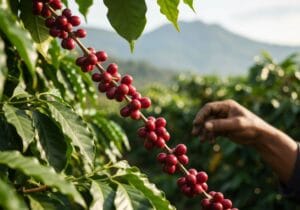Ethiopia is on the verge of becoming a global coffee landmark. Its coffee production has reached new heights, with forecasts indicating a record output of 11.56 million 60-kg bags by the 2025/26 year. This growth is a 9% increase from last year and is driven by good weather and efforts to improve coffee plants. The government has been actively supporting farmers by allowing them to directly export their crops, which has increased market access for smallholders. As coffee culture transforms into global social hubs, Ethiopia stands to benefit greatly from this trend.
In addition to production, coffee exports are also expected to rise. Ethiopia is set to export around 7.8 million bags by 2025/26, up 11.4% from the prior year. This growth is fueled by expanding demand in key markets like Germany and Saudi Arabia. The country aims to elevate its position as the next-largest coffee exporter in the world by 2033.
Coffee’s popularity isn’t just growing internationally; domestic consumption is also increasing. More people in Ethiopia are drinking coffee, partly due to urbanization and cultural traditions. This growing demand helps keep the coffee market stable for local farmers.
Ethiopia’s growing coffee culture, driven by urbanization and tradition, bolsters local farmers’ market stability.
The country’s focus on coffee innovation is evident through its quality improvement initiatives. Campaigns encouraging the replanting of coffee plants with improved seedlings have upgraded bean quality. The Green Legacy Initiative, aiming to plant billions of trees, supports sustainability practices in coffee production. This not only helps with climate resilience but also promotes healthier ecosystems.
Ethiopia’s Extensive Coffee Development Strategy aims to modernize and expand the coffee sector. The government is shifting attention from crops like khat to coffee farming, promoting better profitability. Additionally, the great diversity of Coffea arabica cultivation in Ethiopia allows for the production of distinctive flavor profiles that appeal to global markets. This uniqueness is reflected in the global adaptations that coffee establishments implement to cater to discerning consumers.



